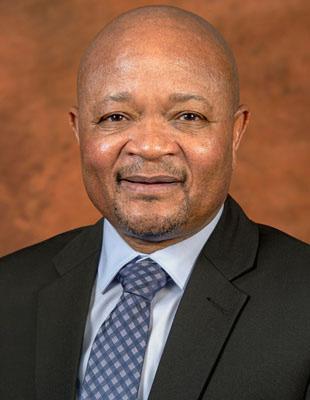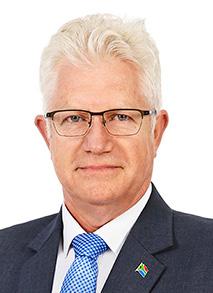
9 minute read
SERVE AND DELIVER
Local Government Finance
National Treasury has released the local government revenue and expenditure report for the second quarter of the 2022/23 financial year. The report is part of the In-year Management, Monitoring and Reporting System for Local Government, which enables provincial and national government to exercise oversight over municipalities and identify possible challenges in implementing municipal budgets.
Aggregate Trends
Municipalities spent 42.3% (R235.9-billion) of the total adopted expenditure budget of R557.8-billion as of 31 December 2022. In respect of revenue, aggregate billing and other revenue amounted to 48.5% (R270.3-billion) of the total adopted revenue budget. Of the adopted operating expenditure budget amounting to R488.2billion, 44.2% (R215.8 billion) was spent by 31 December 2022.
Municipalities have adopted the budget for salaries and wages expenditure at R146.6-billion (including remuneration of councillors), which is R8.6-billion more than the adopted budget of R138-billion reported in the second quarter of the 2021/22 municipal financial year. This constitutes 30% of their total operational expenditure budget of R488.2-billion. As of 31 December 2022, spending on salaries and wages is 46.2% (R67.8-billion). Capital expenditure for all municipalities amounted to 28.8% (R20.1-billion) of the adopted capital budget of R69.8-billion. Aggregated year-to-date operating expenditure for metros amounts to 46% (R134.3-billion) of their adopted budget expenditure of R292.1billion. The aggregated adopted capital budget for metros in the 2022/23 financial year is R32-billion, of which 26.8% (R8.6-billion) was spent by 31 December 2022.
As of 31 December 2022, aggregated revenue for secondary cities is 44.1% (R35.2-billion) of their total adopted revenue budget of R71.4billion for the 2022/23 financial year. The year-to-date aggregated operating expenditure level of the secondary cities is 42.6% or R30.2billion of the total adopted operating budget of R70.9-billion for the 2022/23 financial year. Capital spending levels for secondary cities reported an average of 29.2% (R2.5-billion) of the adopted capital budget of R8.5-billion.
Aggregate municipal consumer debts amounted to R305.8-billion as of 31 December 2022.
Government debt accounts for 7.5% (R22.9-billion) of the total outstanding debtors. The largest component of this debt relates to households which account for 71.1% (R217.7-billion)
Metropolitan municipalities are owed R154-billion in outstanding debt as of 31 December 2022. The largest contributors were the City of Johannesburg (28.8%), Ekurhuleni (19.9%), eThekwini (14.5%), Tshwane (11.8%) and Nelson Mandela Bay (9.8%).
Municipalities owed their creditors R86-billion as of 31 December 2022 and provinces with the highest percentage of outstanding municipal creditors in the category greater than 90 days include Northern Cape (90.4%), Mpumalanga (90.2%) and North West (83.7%). The total balance on borrowing for all municipalities equates to R59.1-billion as of 31 December 2022. This includes long-term loans of R44.3-billion, long-term marketable bonds of R8.4-billion, and other long-term nonmarketable bonds of R5.1-billion. The balance represents other short- and long-term financing instruments.
As of 31 December 2022, the total investments made by municipalities equate to R43.1-billion.
Conditional Grants
The 2022/23 municipal performance for the second quarter publication on conditional grants shows an improvement from the previous quarter, but at a slower rate year-on-year, with a considerable performance increase of 64.9%.
Municipalities spent 31.9% of their total allocation in the second quarter of 2022/23.
As of 31 December 2022, 55.3% (R22.5-billion) of the R40.6-billion allocated to municipalities in direct conditional grants for 2022/23 had been transferred to municipalities.
The metro municipalities have a total allocation of R11.2-billion in direct transfers of which 45.6% (R5.4-billion) was transferred. As at the end of December, 56.1% (R3-billion) of the total R5.4 billion transferred to metropolitan municipalities, had been spent
The second quarter shows a slight improvement over the performance reported during the first quarter of the current financial year, however the improved expenditure is at a declining rate compared to the previous financial year. This is a clear indication that municipalities’ project implementation planning is deficient, and it is one area that needs improvement.
Water And Electricity Security
Anton Bredell, Western Cape Minister for Local Government, Environmental Affairs and Development Planning, presented the Department of Local Government’s budget of R369.9million for 2023/24. Bredell said although the department is one of the smallest in the Western Cape government, it is making a huge impact in how residents of the province experience government service delivery. “Our role as the department is to ensure that municipalities govern well, which in turn means that residents receive the best possible municipal services.”
Bredell said R89-million that was allocated earlier this year as an emergency measure to municipalities to procure backup generators for water systems, had already transferred to municipalities in the Western Cape.
Due to the risks caused by the electricity disaster, the department’s budget has a significant allocation of R57.6-million towards the Western Cape Energy Response strategy. This includes:
• R30-million to pilot renewable energy solutions in municipalities.
• R5-million (R2-million in 2023/24 and R3-million (2024/25) for the provision of specialist service providers to assess the feasibility of potential renewable energy options.

• R5.3-million (R1.7-million in 2023/24, R1.8-million in 2024/26 and R1.8-million in 2025/26) towards the Municipal Electricity Master Planning Programme.
• R17.3 million (R5.8-million for 2023/24, R5.8-million for 2024/25 and R5.8-million for 2025/26) for additional critical skills and capacity to support the energy programme. Bredell said other focus areas for the department include the continued support of the Sustainable Infrastructure Development and Finance Facility programme, which helps local governments to package large infrastructure projects for potential private sector co-funding. The programme receives R6-million in the 2023/24 budget to strengthen its project management capacity.
There is also an amount of R10.3-million allocated in the 2023/24 budget towards the mitigation of disaster risks. As part of the provincial focus on climate change, R25-million is allocated in this financial year to explore innovative responses for waterresilience interventions.

Mchunu Partners With Europe
The MoU between South Africa and Finland aims to promote water security and is focused on integrated water resources and river basin management, including the management of groundwater/aquifer and surface water as well as adaptation to, and mitigation of the impacts of climate change in water resources management as well as hydrological extremes, including flood, drought, water quality, waterborne diseases and water-related risk management.
“Integrated Water Resources Management is the dominant paradigm in contemporary water resources management. Finland has implemented such an approach for decades, aiming at win-win partnerships. It has also been the guiding principle in Finnish water legislation. Signing this MoU is a muchneeded boost the sector requires back home,” Minister Mchunu stated. Meanwhile, the MoU with the Netherlands has been renewed for an additional four years and it is aimed at collaborating on inspiring and capacitating young talents in water, climate and sustainability in South Africa and abroad.

Coct On Tackling Energy Crisis
At Premier Alan Winde’s fourth Energy Digicon, the executive mayor of Cape Town Geordin Hill-Lewis outlined how the City of Cape Town (CoCT) is tackling the energy crisis:

Renewable power without battery storage – this would help ensure sufficient power supply.
The CoCT will make public a tender for 500MW of dispatchable power. Small-scale embedded generation – allowing people to be net generators of energy at their homes or businesses. Excess power can be sold back to the municipality; businesses can currently do this, and households will be able to by the end of 2023.
The Power Heroes initiative – where residents are rewarded for reducing their power use.
“The measures the CoCT is implementing are very encouraging. Cape Town’s population is growing at a rapid rate and it is important that the mayor and his team do everything they can to boost power production, protecting households and businesses from severe blackouts.

This includes embracing innovation. I urge all our municipalities to put the needs of our citizens first amid this crisis and to continuously work on their energy plans,” Premier Winde said.
Public Sector Online Threats
The launch of the Cybercrimes Act is a very telling indicator of the fervour with which global threat actors are eyeing South Africa as a target for online exploitation. The act seeks to expand jurisdiction for law enforcement to regulate cybercrime, allowing government to enter into agreements with foreign states and be better able to detect, prevent and mitigate potential attacks.
Already, major private and public sector institutions are being breached more frequently over time. While a legislative framework is a positive step, ensuring the security of our state resources and vast amounts of data on each citizen requires the appropriate online tools.
The challenge for the State is the limited available high-level cyber security skills as well as the mounting cost of technology, mainly the traditional anti-malware software.

The development of extended detection and response (XDR) platforms has now changed how entities will manage their security, allowing them to better protect their data in a managed centrally system powered by AI, that grows and adapts alongside organisations, in real time. As it collects data from previously separate tools, XDR allows for easier and faster investigation of threats and breaches, as well as advising on the best response based on previous results across a much wider network.
Training staff members can go a long way in securing the environment. This, together with the support of XDR systems that instantly analyse data from across the organisation to predict and prevent emerging threats, identify root causes and respond in real time, is the path of action we need to take in the South African public sector to protect our industries and economy.
By Carlo Bolzonello, Trellix SA country lead
Call For Accelerated Service Delivery
MEC for Cooperative Governance, Human Settlements and Traditional Affairs, Nono Maloyi has urged municipalities to spend their infrastructure grants allocation to curb poor service delivery which is mainly due to poorly maintained infrastructure.
Malolyi said most of the recent service delivery protests are because of lack of provision of basic services by municipalities and that the grants are meant to eradicate municipal infrastructure backlogs and ensure the provision of basic services. He said while municipalities are failing to pay Eskom and water utilities, they are also owed large amounts of money by some departments. He added that the department of Cooperative Governance and Traditional Affairs and Provincial Treasury will work on a strategy to assist municipalities to recoup monies owed to them by other departments.
“Municipalities must consider investing in pre-paid meters where possible. Consumers will have no option but to pay for what they use. In that way, municipalities will be able to generate revenue and meet their financial obligations.”
MPUMALANGA’S FOCUS AREAS
In February 2023, the Premier of Mpumalanga Province Refilwe MtsweniTsipane delivered the Mpumalanga State of the Province Address (SOPA) and reflected on the six focus areas for the province:
1. Job creation and youth empowerment initiatives
2. Infrastructure development

3. Local government support and advancement of service delivery measures
4. Improvement of health and educational facilities
5. Strengthening of accountable state
6. Just transition
Among these focus areas, the premier spoke about the basic service delivery and local government challenges faced by municipalities within the province. “Refuse removal remains a challenge for most of our municipalities,” said the premier, while also providing a solution that will assist in addressing this challenge – the Municipal Infrastructure Grant (MIG) framework has been revised to allow municipalities to procure solid waste removal trucks through the MIG allocation to improve access to refuse removal.
Some of the achievements within the sphere of local government that were highlighted by the premier include:
• Progress made in addressing water challenges in Thembisile Hani and Dr JS Moroka Local Municipalities through the Loskop Dam water project.
• Communities around Lothair, Chrissiesmeer, Warbuton and Balfour will get consistent and reliable bulk water supply through the regional bulk water infrastructure project in Gert Sibande District.
• A Provincial Water Master Plan has been developed and will be adopted as a blueprint to guide water infrastructure development in the province. This will assist many of the bulk water infrastructure challenges that are experienced by municipalities.
• The Department of Water and Sanitation has commenced with the feasibility and environmental impact assessment studies for the Mountain View Regional Dam, which will augment water supply within the Ehlanzeni District. This project is estimated to be completed by 2027/28.
• The Public Private Growth Initiative (PPGI) operational framework has been approved, to respond to the challenge of unfunded catalytic projects and programmes in the District Development Model (DDM) One Plans. Ehlanzeni District will be piloted, with the programme also being rolled out to Nkangala and Gert Sibande Districts to assist with mobilising investors/partners on unfunded programmes. The premier indicated that all these programmes will be implemented through the District Development Model (DDM) approach.
As part of her concluding remarks, Premier Mtsweni-Tsipane said, “As a province we are now standing at a crossroad, where we can either find pathways to inclusive growth and shared prosperity, where no-one is left behind or as a nation we collectively descend further into the abyss of extreme poverty, unparalleled inequality and social instability.”
SALGA, as an association that represents the interests of municipalities, was also part of the SOPA and continues to appreciate the good working relations that the organisation has with the provincial government as well as the Mpumalanga Legislature. In 2014, SALGA and the Mpumalanga Provincial Legislature signed a Memorandum of Understanding (MoU) which aimed to strengthen relations and formalise a working partnership. The MoU is currently being reviewed so that the current needs of the local government sphere can incorporated and included.








